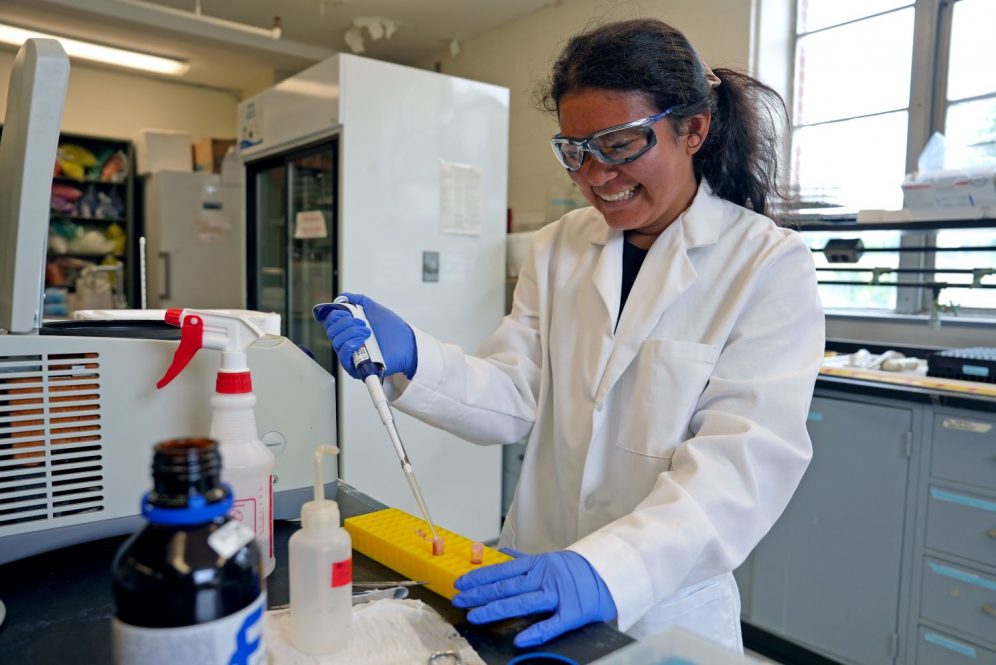Maternal nutrition has a major impact on the mother’s offspring, for humans and other animals.
Alana Wolfson ’27 (CAHNR) is studying if maternal nutrition in sheep could impact not just one generation of lambs, but many.
Wolfson, an animal science major in the pre-veterinary concentration, is working with Sarah Reed, associate professor of animal science, to study the impact of poor maternal nutrition on a ewe’s lambs and their offspring after that.
Wolfson is comparing the impact of under- and over-nutrition on these offspring. For sheep in the under-feeding group, they receive 60% less nutrients than is recommended and over-feeding receive 140% of that recommendation.
“This is really important because I’m trying to look at how their dam or granddam’s diet can impact their energy metabolism and the mitochondria they generate,” Wolfson says. “So, basically, I’m looking at how diet can impact something on such an extreme cellular level.”
By the end of the summer Wolfson hopes to isolate mitochondria from the sheep samples and send them to a lab for analysis of DNA methylation.
DNA methylation is a process in which molecules known as methyl groups are added to DNA molecules to change their activity.
“More methylation is usually a bad sign,” Wolfson says. “It means the mitochondria aren’t working as well as they should. They’re inhibited in some way.”
Previous research suggests that restricted or high-fat diets are associated with a reduced number of mitochondria, poorer functioning, and changes in their structure.
Because mitochondria support so many normal processes in the body, changes to mitochondrial functioning translate to many health problems in the animal.
“The impacts would scale greatly,” Wolfson says. “Because the mitochondria are responsible for energy production, and you need energy to sustain all life processes. When you breathe, when you grow and develop, you need mitochondria to support that.”
Wolfson has been working with Reed since her freshman year. Wolfson first met Reed at orientation and was immediately interested in the research Reed was doing at UConn.
“We clicked right away,” Wolfson says.
Wolfson’s interest in animal health started years ago when she worked at animal shelters. There, she noticed nutrition often determined if an animal would survive or not.
“Nutrition was basically determining life or death for some of these animals,” Wolfson says.
“So, this [research] does connect with animal welfare and that’s something I’m really passionate about.”
Wolfson is completing this work as a Summer Undergraduate Research Fellow for the American Physiological Society.
Wolfson was selected as one of 12 fellows from around the country. The fellows and their professors meet weekly to discuss their research and provide one another with feedback. In the spring, the fellows will meet in person to present research posters.
“I like how it’s a nice networking opportunity,” Wolfson says. “It’s cool because even though we’re meeting online I get to have all these connections.”
Wolfson has also received an IDEA grant for the fall semester to continue this project. With that new funding she will turn from studying the mitochondria to analyzing the impact of poor maternal nutrition on the sheep’s cell membranes and lipids.
“It’s really cool that I get to look at different aspects and really dive into it,” Wolfson says.
This work relates to CAHNR’s Strategic Vision area focused on Enhancing Health and Well-Being Locally, Nationally, and Globally and Ensuring a Vibrant and Sustainable Agricultural Industry and Food Supply.
Follow UConn CAHNR on social media



